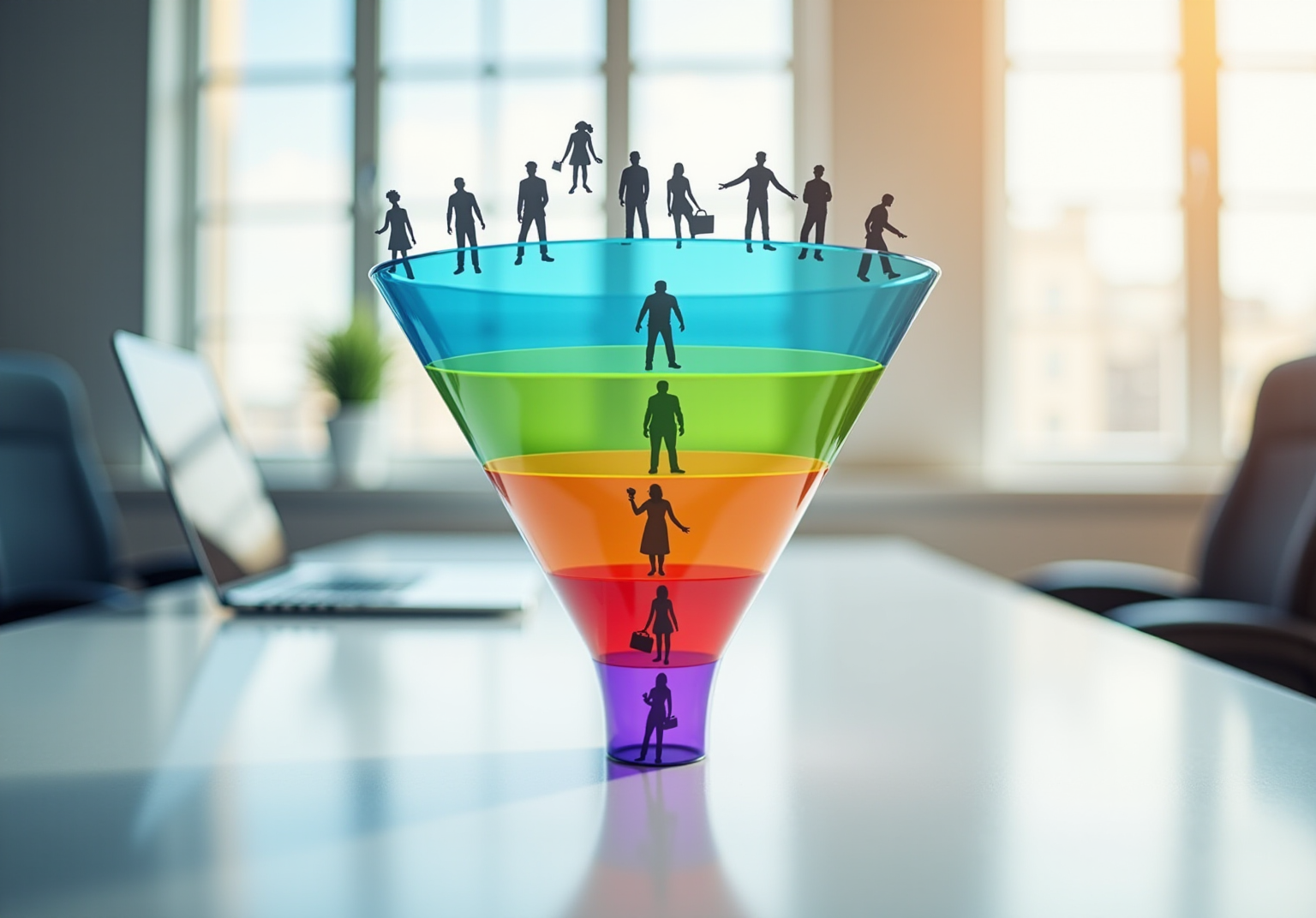
Overview
The article asserts that understanding marketing funnel examples is crucial for the success of Direct-to-Consumer (DTC) companies. It delineates the five key stages:
- Awareness
- Consideration
- Conversion
- Loyalty
- Advocacy
By tailoring marketing strategies to each stage of the funnel, companies can effectively engage customers, enhance conversion rates, and foster long-term loyalty. This assertion is substantiated by case studies that showcase significant improvements in revenue and customer engagement, reinforcing the necessity for DTC companies to adopt these strategies for sustained success.
Introduction
The journey from a mere spark of interest to becoming a loyal customer is intricate and essential for Direct-to-Consumer (DTC) brands. Understanding the marketing funnel is crucial; it delineates the distinct phases a customer experiences, from awareness to advocacy. By mastering this framework, companies can significantly enhance their marketing strategies, ensuring resonance with consumers at every step. However, how can DTC brands effectively navigate this complex landscape to attract and retain customers in an ever-evolving market?
Define the Marketing Funnel: A Comprehensive Overview
The serves as a foundational framework that illustrates the , starting from initial awareness of a product or brand to the and beyond. This process, often illustrated as a marketing funnel example, is typically delineated into five critical phases:
- Awareness
- Consideration
- Conversion
- Loyalty
- Advocacy
Each phase serves as a marketing funnel example, representing a unique stage in the designed to guide prospects along a structured pathway that culminates in conversion. Understanding this model is crucial for (DTC) companies, as it empowers them to tailor their effectively, ensuring they engage with clients at every step of their journey.
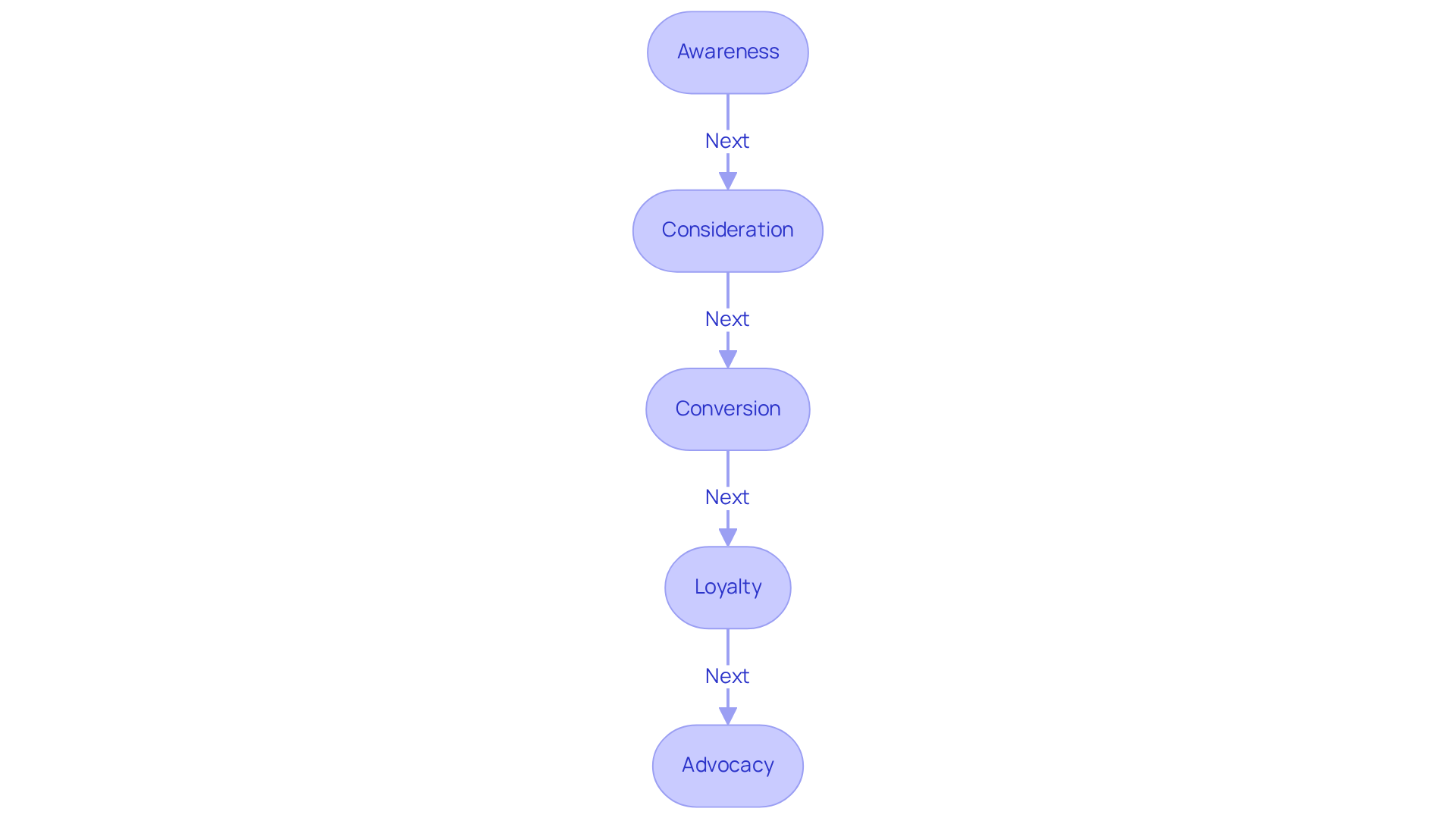
Explore the Importance of Marketing Funnels in DTC Strategies
A is indispensable for DTC companies, providing a systematic approach to understanding consumer behavior and preferences. By delineating the client journey, companies can identify and refine their marketing strategies accordingly. This structured methodology serves as a marketing funnel example, attracting new customers while nurturing existing ones, ultimately leading to and enhanced customer loyalty.
For example, 's collaboration with a $30M apparel company led to a remarkable 35% increase in conversion rates and a 10% boost in revenue per visitor after optimizing their homepage and implementing strategic upsells. Similarly, a $15M cleaning product company experienced an 80% surge in by testing free shipping thresholds and introducing bundles.
These case studies illustrate that companies effectively leveraging a marketing funnel example can achieve in their (ROI) by tailoring their messaging and offers to meet the specific needs of customers at each stage of the marketing funnel.
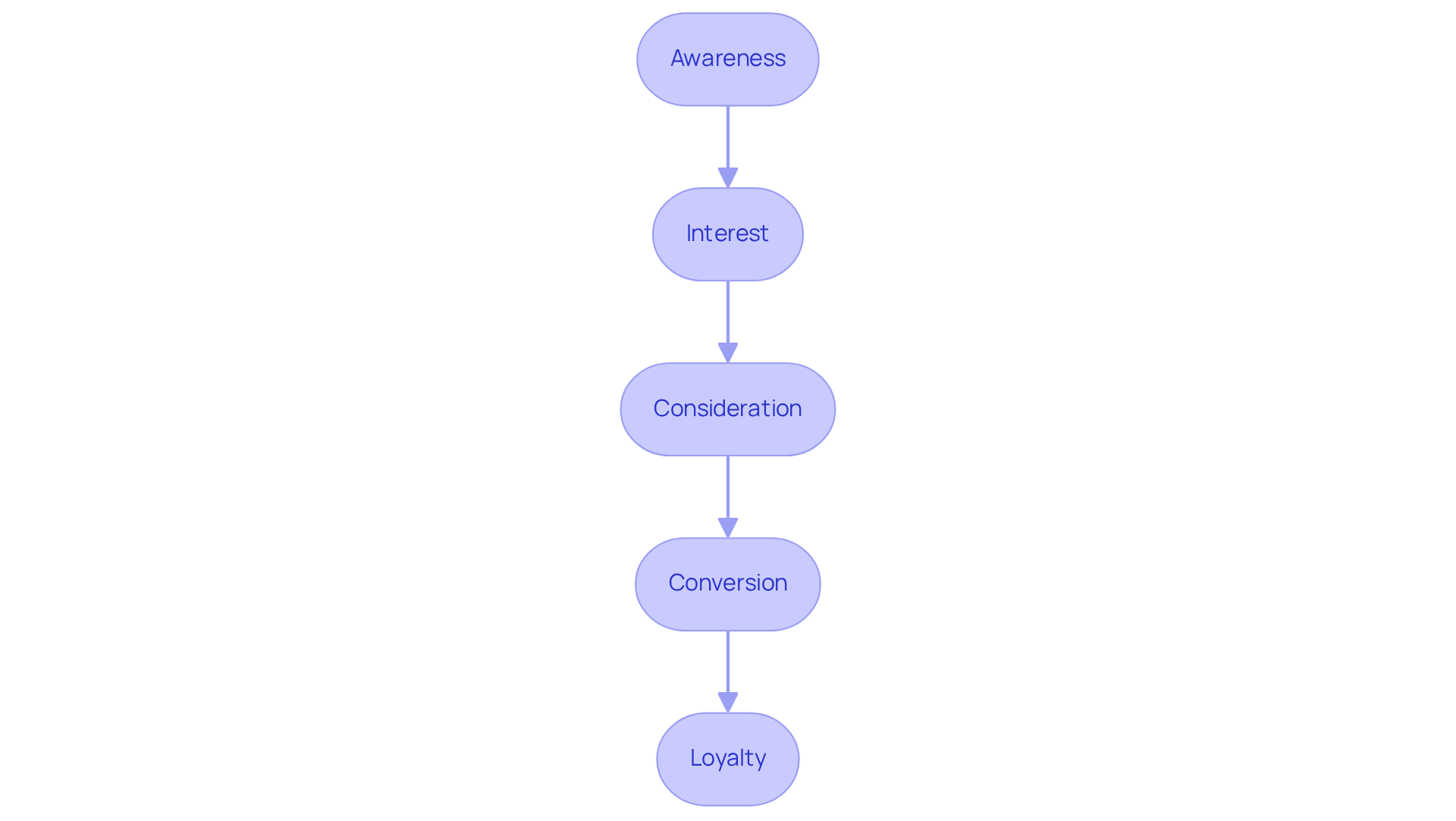
Examine Real-World Marketing Funnel Examples for DTC Brands
have effectively harnessed a to drive substantial growth. For instance, a skincare brand initiates awareness campaigns on social media, leveraging to extend its reach to a wider audience. Once potential clients are informed, the brand engages them through that highlights product benefits and user testimonials, leading them into the consideration phase. Ultimately, by offering or free trials, the brand fosters conversions. This is a marketing funnel example that not only enhances but also cultivates loyalty, as satisfied clients are more likely to support the brand, thus completing the cycle.
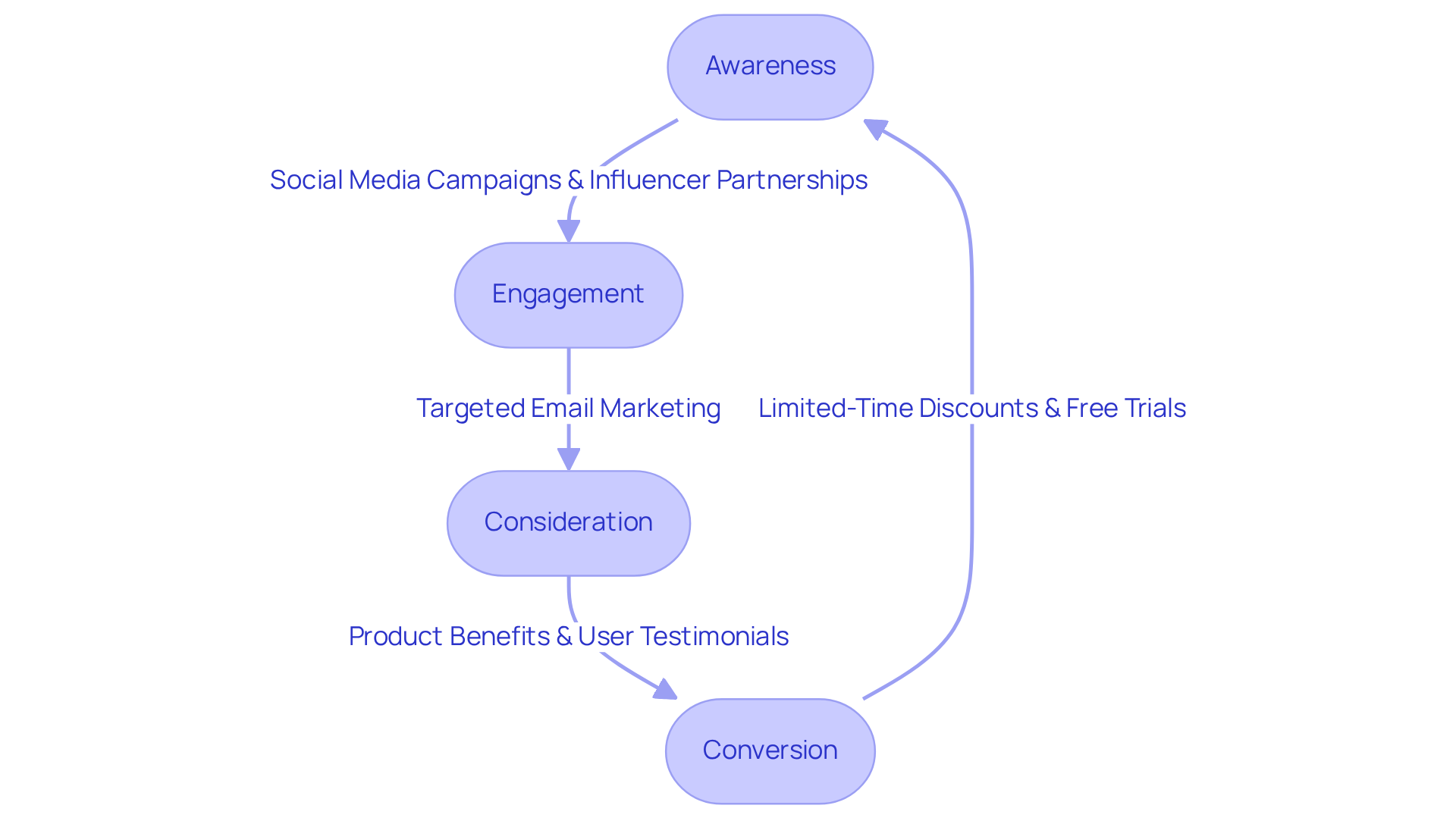
Analyze the Stages of the Marketing Funnel and Their Impact on DTC Success
The marketing funnel example encompasses several critical phases, each playing a vital role in the buyer's journey. In the Awareness phase, potential clients first encounter a company, typically through advertising or social media. Subsequently, during the Evaluation phase, buyers scrutinize their options, comparing products and examining reviews. The , where companies can enhance outcomes by and offering incentives.
, concentrating on strategies that not only boost conversions but also emphasize . By leveraging data-driven decisions, companies can and improve profitability. Upon initiating a partnership, Parah Group undertakes an onboarding process to , ensuring effective communication and support throughout the journey.
After conversion, the Loyalty phase focuses on and engagement, while the Advocacy phase motivates satisfied customers to advocate for the brand. Each stage of the marketing funnel example necessitates tailored strategies to maximize effectiveness, ultimately facilitating greater DTC success.

Challenges in Implementing Effective Marketing Funnels
Establishing effective presents significant challenges. often struggle to monitor across various channels accurately, leading to gaps in understanding the . Moreover, creating content that resonates at each stage of the process can be resource-intensive. Brands frequently encounter obstacles in maintaining engagement post-purchase, a critical factor in and advocacy. However, by leveraging and customer feedback, brands can refine their funnel strategies. This ensures they meet the evolving needs of their customers and drive .
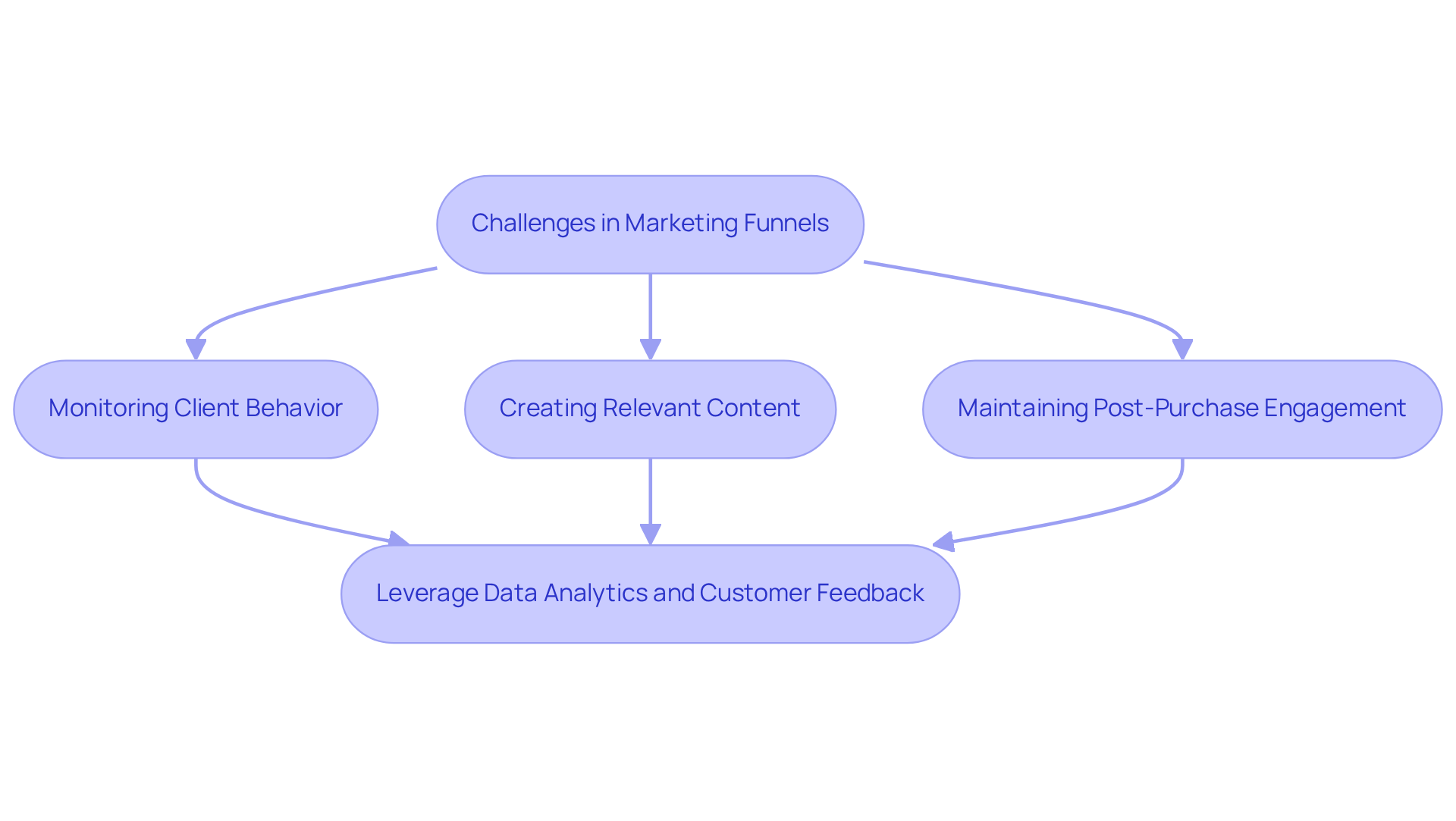
Conclusion
Mastering the marketing funnel is paramount for Direct-to-Consumer (DTC) companies striving for success in today's competitive landscape. This framework meticulously maps the customer journey from awareness to advocacy, equipping brands with critical insights necessary for effective engagement at each stage. By adopting a well-structured marketing funnel, companies can refine their strategies, ultimately driving increased conversions and fostering customer loyalty.
Each phase of the marketing funnel—awareness, consideration, conversion, loyalty, and advocacy—plays an indispensable role in influencing consumer behavior. Real-world examples, showcasing the triumphs of various brands through tailored marketing strategies, illustrate the tangible advantages of leveraging this model. Furthermore, the challenges encountered in developing effective funnels highlight the necessity of employing data analytics and customer feedback to enhance approaches and promote sustained growth.
In conclusion, the importance of mastering marketing funnels for DTC brands cannot be overstated. As the marketplace continues to evolve, companies must remain agile, adapting their strategies to align with the shifting needs of consumers. Embracing the marketing funnel not only enriches customer engagement but also establishes a solid foundation for long-term success. By prioritizing this structured approach, brands can convert potential customers into loyal advocates, ensuring a prosperous future in the DTC arena.
Frequently Asked Questions
What is the marketing funnel?
The marketing funnel is a framework that illustrates the phases a prospective buyer goes through, from initial awareness of a product or brand to the ultimate decision to purchase and beyond. It typically consists of five phases: Awareness, Consideration, Conversion, Loyalty, and Advocacy.
Why is understanding the marketing funnel important for Direct-to-Consumer (DTC) companies?
Understanding the marketing funnel is crucial for DTC companies as it allows them to tailor their marketing strategies effectively, ensuring they engage with clients at every step of their journey. This leads to improved customer interactions and higher conversion rates.
How does the marketing funnel help in refining marketing strategies?
The marketing funnel helps companies identify critical touchpoints in the client journey, enabling them to refine their marketing strategies. By understanding consumer behavior and preferences, companies can attract new customers and nurture existing ones, ultimately enhancing conversion rates and customer loyalty.
Can you provide examples of companies that benefited from optimizing their marketing funnels?
Yes, for instance, the Parah Group's collaboration with a $30M apparel company resulted in a 35% increase in conversion rates and a 10% boost in revenue per visitor after optimizing their homepage and implementing strategic upsells. Additionally, a $15M cleaning product company saw an 80% increase in average order value by testing free shipping thresholds and introducing bundles.
What are the potential outcomes of effectively leveraging a marketing funnel?
Companies that effectively leverage a marketing funnel can achieve substantial improvements in their return on investment (ROI) by tailoring their messaging and offers to meet the specific needs of customers at each stage of the funnel.
FAQs











